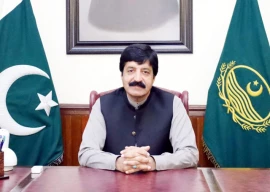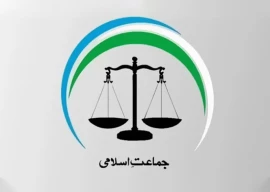
The Pemra chairman has insisted defensively that “no definition for obscenity or vulgarity exists in the Constitution, the Pakistan Penal Code or Pemra laws”. One Pemra official thinks a reference to parliament will have to be made, too, but at the present juncture, it appears that the Court might present the legislature with a pious fait accompli.
Defining vulgarity or fahashi is an intellectual exercise. In Pakistan, any clash of intellect with ideology is to be feared because the former will be predictably defeated by the latter. And any reference to ideology is bound to hand the field over to the currently powerful clergy by reason of their direct or indirect nexus with the Taliban, which has already taken steps to extirpate vulgarity from various parts of the country. This is not the first time that an intellectually impoverished Pakistan has confronted the problem of vulgarity on TV. In 2003, under the rule of a ‘permissive’ general, a debate took place on the subject that mainly focused on the ‘obscenity’ of Indian movies. The debate petered out mercifully amid confusion and anger because soon the national mind was exhausted getting itself around the word fahashi in a literalist environment that favours Islamic tradition at the cost of local culture.
The crux of the problem is the Muslim man’s incomplete comprehension of entertainment. He needs it as a social safety valve but prefers to enjoy himself only with a guilty conscience. His curtailed intellect — in deference to ideology he cannot modify — will not respond to the challenge of any redefinition of premodern edicts. Luckily, in 2003, Javed Ahmad Ghamidi was still around in Pakistan, unthreatened by the Punjabi Taliban and came to the rescue although his opinion, too, was guardedly offered.
Ghamidi opposed the ban on Indian entertainment and said that only positive state action was good for the people. Banning anything produced rebellion (sarkashi) and boredom (bezari), as was proved by the imposition of monarchy in Saudi Arabia, ‘mullahism’ in Afghanistan and theocracy in Iran. Banning Indian movies would simply be counterproductive. He favoured nurturing moral values till they became so strong that it would be safe for the people to see any kind of entertainment without being corrupted. Amazingly, Ghamidi, as a religious scholar, was able to say that it was political propaganda to say that Indian culture was bad for Pakistanis: “If we don’t have an answer to Pepsi and Coke, we will have to accept them. And if you stop people by force they will find illegal ways of enjoying something that you ban”.
‘Good taste’ differs from people to people but some will favour a ban on TV anchors who shout inanities in their talk shows and spread narrow-mindedness. But what is more likely is the victory of the ideology of the Taliban — and a reversion to General Ziaul Haq’s regime of censorship of the state-owned media and last-minute assault on the print media by section officers wielding moral scissors.
Judiciary is not debarred from intellectual exercise. There was a time when our chief justices made philosophical assessments and were praised for their tolerant worldview. Since any discussion of vulgarity is bound to tilt into edicts of narrow and literalist interpretation, Pakistani society might once again slip into furtive enjoyment of material that civilised society cannot allow. This has happened in the past; it might happen again. Under General Zia, people took to the cassette player (today we have CDs) and even the small cities were invaded by blue movies, which one can’t eliminate without transforming Pakistan into a police state.
Published in The Express Tribune, August 26th, 2012.
COMMENTS (14)
Comments are moderated and generally will be posted if they are on-topic and not abusive.
For more information, please see our Comments FAQ























We surely are living in a very strange country! Country is collapsing & we are discussing vulgarity on TV channels!
Do Internet ring any bell.
@Falcon
He is talking about general prinicipal. All nations and societies define vulgarity as per their own norms, what could be vulgar for someone might not be for others but usually some consensus exists. Saying state has no bussiness in defining that is wrong premise, state does have a saying in this matter as state is the one implementing the consensus of society. In west e.g, certain programs can't be broadcast certain times, programs have rating and advisories, these are all implemented by state.
@Falcon: Rather than comparing the nature of different crimes, the fact is every crime is considered a crime. Let it be murder, rape, bribery or adultery. Mr. Ghamidi is proposing such an angelic society which is simply impossible to be framed. You expect people to behave rationally means dumping all the courts & law enforcement agencies. I am sorry but you enjoy this kind of society in your books but not in real life. This world is full of humans not angels. Stop being so much optimistic & naive that you think "All is Well"
@Akhtar: Very well said by Akhtar. Please notify that freedom without discipline is a chaos.
@Akhtar: So in your view, looking at over-exposed skin is the same as going for extortion / child molestation / rape? How can you even put all of these thing at the same level?
@Akhtar: "Why can’t our media be proactive in highlighting real issues faced by the society rather than relying on filthy eyecatchers promoting nothing other than nudity in the general public."
Commercial media values ratigs. What would you logically expect in a c ountry which had the highest number of online searches for porn?
Good points raised in very convincing words. In my view entertainment is something we all want and in case of vulgarity, we have a choice to change the channel if the program aired is deemed to be anything other than normal viewing. We have a choice. There are other aspects. The encouragement of so many shows and stories on TV and cinema have increased the number of people working in these branches. Limiting their choices would increase joblessness. Worst scenario is that people will watch Indian channels and movies, If they are banned, many will turn to illegal CDs as has been the case for the last 30 years. In my view the problem for the objection is not that we do not want to watch such 'vulgar' programs. WE do. But we do not want is that our daughters should see them. This is the old story of what we do in our youth and make sure that our females do not get taste of our preferences. This is the other version of our "honor" regarding our women folks.
Ghamdi sahab's analogy would only make any sense if we have a similar strategy for other evils such as bribery, bhatta, drugs, child molestation, rape, etc. I don't think anybody can think of allowing them just because a section of culprits will become Sarkash !
Why can't our media be proactive in highlighting real issues faced by the society rather than relying on filthy eyecatchers promoting nothing other than nudity in the general public.
Judiciary is not for running the the governance and it should refrain from advising what policy is to be formulated. Judiciary is pushing the country unintentionally to Talibanize the society. . Obscenity can not be defined in absolute terms. It is always a relative term. To me something is obscene which may not be the same to my neighbor depending on their perception which is also developed from the back ground of culture , up bringing, peer group etc.. Definition of obscenity Mullah/, people from rural back ground, and urban people is bound to vary . As the country is obsessed with religion there will be insistence that it should be as per the guidelines of Holy book Qur'an . Once the Holy book is involved little resistance will come up as no body would like to oppose it .
Any enactment formulation of policy or a legislation must come from the executive Institution i.e. National or provincial Assembly without any sort of interference from Judiciary. A wrong precedence is taking place by advising the Executive what to do( irrespective of what is suggested is valid and correct ) .Let the democracy work their job. As per your perception/logic ( which may also be correct) Judiciary is not meant for governance. judicial activism in the area of governance will hurt the democracy and judiciary also in the long run.
another useless editorial from ET
Good analysis. Ghamidi's analysis was on the spot. Negative dictations hardly make things better. They just make people more hypocritical. However, in the interest of objective discussion, it is a good idea not to put all people in Pro-Taliban and anti-Taliban camps; this hurts the credibility of discussion because of reliance on undesirable symbols.
Its only time passing order...nothing more